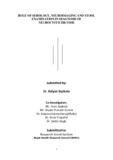Please use this identifier to cite or link to this item:
https://hdl.handle.net/20.500.14356/393| Title: | Role of Serology, Neuroimaging and Stool Examination in Diagnosis of Neurocysticercosis |
| Authors: | Sapkota, Kalyan |
| Issue Date: | 27-Dec-2012 |
| Keywords: | Neurocysticercosis |
| Description: | Neurocysticercosis (NCC) is the infection of Central nervous system by the larval stage of Taenia solium (pork tapeworm). It is the most important parasitic neurologic disease and a common cause of epilepsy in Asia, Africa and Latin America; representing enormous cost for anticonvulsant and medical resources (1). Taenia solium causes two different diseases. When the adult cestode infests the human intestine, taeniasis develops; it is generally asymptomatic, but the host becomes a continuous source of taenia eggs, which are expelled every day in the feces, which may then contaminate vegetables and food in areas with poor sanitary conditions. Human cysticercosis occurs by ingestion of faecally contaminated food, water or vegetables containing eggs of T. solium (2-4). However, ingestion of infected pork only causes intestinal tapeworm infestation (taeniasis) (5). This tapeworm is a public health problem in most developing countries where pigs are raised and pork is consumed and where poverty, illiteracy and deficient sanitary infrastructure are common (3). The main objective of this study is to find out the diagnostic significance of Serology and Neuroimaging and to detect intestinal carriers of the tapeworm. |
| URI: | http://103.69.126.140:8080/handle/20.500.14356/393 |
| Appears in Collections: | Post Graduate Grant (PG) Reports |
Items in DSpace are protected by copyright, with all rights reserved, unless otherwise indicated.

